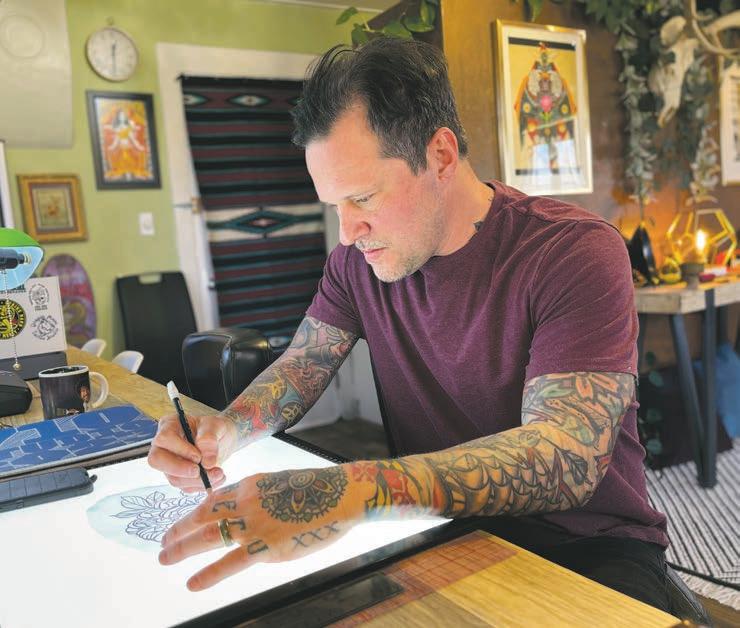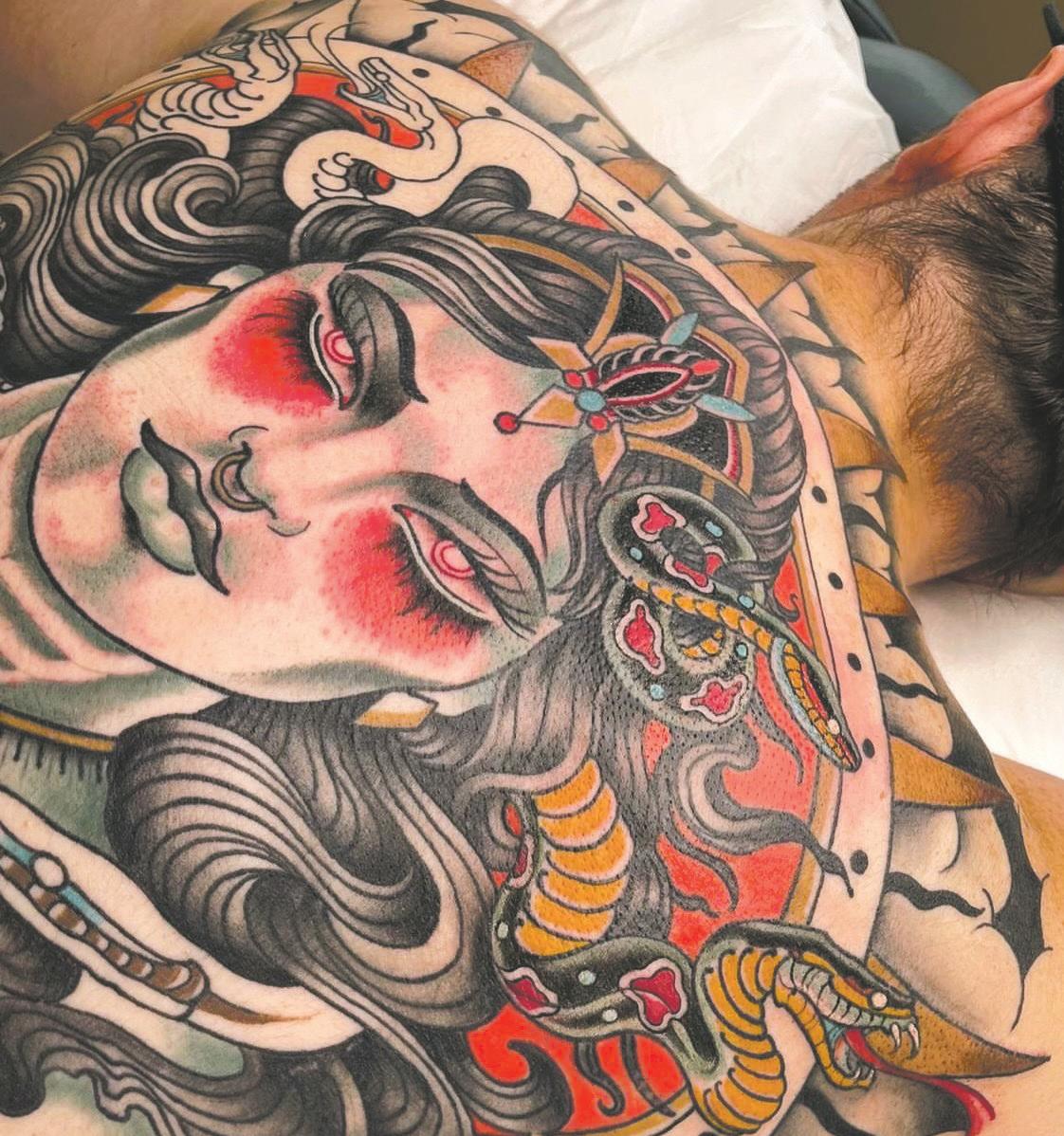
5 minute read
A&C
Deep Cuts
After 20-plus years of tattooing, artist Jeffrey Pitt finds his place
Advertisement
BY ALEX DE VORE alex@sfreporter.com
As we sit in his tastefully appointed studio amongst his drawings, paintings and in-progress tattoos, Pitt seems happy— like he’s finally found his thing. He doesn’t publicize his address or phone number. Don’t fret, though, he’s not hard to find through Instagram (@seven_ten_studio). It’s more like he prefers to be a little more selective with clientele these days, to work without distractions and to take on pieces about which he’s passionate.
Seven Ten Studio isn’t the kind of place where you’d take your whole crew to watch the session or where you’d walk in to get a little flower on your ankle. Seven Ten is for the serious collector, and also about as far removed from what Pitt envisioned for himself as can be. It’s the culmination of decades of work, personal growth, a dizzying bout with addiction and, ultimately, a marriage to his “perfect partner,” Alexandra, which Pitt says saved his life. It’s what he was meant for, he says, he just had to grow enough to see that.
But first, let’s go back: By the time Pitt first visited Santa Fe in 1994, he says, he had just one tattoo—a spiral tribal number he’s long-since covered up. Everyone has a tattoo these days, it seems, but even in the early ’90s, it was still considered lowbrow, for the scary biker, the military guy, the criminal. Out of school and feeling adrift in his hometown of Baltimore, Pitt visited friends in Lamy. He stayed the summer and eventually moved here full-time the following year.
That was also around the time he met tattooer Dawn Purnell, an artist he credits with setting him down the path.
He began collecting work from Purnell and making friends in the tattoo sphere. Life was good, but Pitt was restless. He picked up and moved to Hawaii.
“I knew no one, I had very little money,” he says. “I was just throwing myself into anonymity, a clean slate.” He lived on Hawaii for two years, working as a desk guy in a tattoo shop and taking on a short-lived apprenticeship. He kept in contact with Purnell, and though he says he wouldn’t trade those days, they weren’t exactly easy. And then, as it goes, he met a woman named Gina Marie, and together they moved back to Santa Fe. She’s still here, too, kicking ass as a tattooer in Albuquerque.
Upon his return to New Mexico, he began collecting work from Purnell more seriously. Today, she runs Dawn’s Custom, but back then, she was working with legendary and since-deceased tattooer Bill Wissman, the originator of Four Star Tattoo. That’s where Pitt would meet Mark Vigil, with whom he’d go on to complete his apprenticeship and who operates Four Star to this day.
“In 2000, I started working the desk at the old Four Star on Guadalupe Street,” Pitt says. “I slowly started getting to know Mark, and he knew what my interests were in tattoo. Surprisingly, he pulled me aside one day and said he’d be willing to apprentice me. Back then, those were hard to get. It was like winning the lottery.”
Pitt has made a name for himself with clean, bold lines and a versatile style. Though it might be simpler to define his tattoo work as an almost nouveau take on American traditional, he’s proven just as adept at the medium’s mainstays: Japanese, black and grey, minimalism, devotional or geometric.
Pitt worked at Four Star for several years before returning home to
Baltimore. There, he co-opened the shop Read Street, and was named one of the best tattooers in the country in an internet poll. But there, he’d sink into addiction. He talks about that openly, saying it’s absolutely a part of his story. Pitt went into treatment several times, but it eventually became clear that he couldn’t live a sober life in Baltimore. As a last-ditch effort to get it together, he phoned his old mentor, Vigil, and explained his situation. Vigil agreed to hire him back at Four Star. And so he returned to Santa Fe for the third time in 2013.
“It’s a safe place and I could get away from all the stuff,” he says.
Pitt still struggled to stay sober, and he lost the Four Star gig, which he says was the ultimate wake up call. He attempted treatment again, and it finally took. Purnell would hire him on at Dawn’s Custom, and he worked there for a few more years.
Which just about brings us to today. Pitt has stayed sober for some time and discovered his love of working privately. He’s open to new clientele, but he also gets to set his own schedule—two appointments a day, five days a week. His artwork has also probably never looked better.
ALEX DE VORE
ABOVE: A recent medusa backpiece has been turning heads according to Pitt. BELOW: Jeffrey Pitt at work on an upcoming tattoo.







